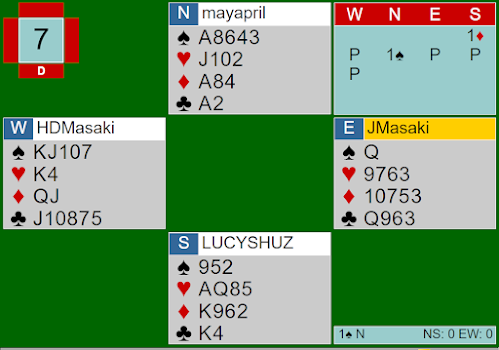Question: What rules are there to decide to bid from what seat when
you have 12 HCPs?
Vic:
The
“rules” are whatever you & partner agree they should be.
A
common partnership agreement is that 1st & 2nd seat opening bids should absolutely promise a “solid” hand. The classically accepted Total Point Count
(TPC) standard for “solid" is 13-21 points. Audrey Grant teaches that you
can add length points to high card points (HCPs) to determine your TPC.
The
Quick Trick standard for “solid" is at least 2. The Loser Count standard
for “solid” is not more than 7. Most often, hands that meet the Total Point
Count standard will also meet the Quick Trick & Loser Count standard, but
not always. You need to consider all three standards when you evaluate a hand.
An
example I often cite to my students is a hand with all 4 Queens + all 4 Jacks +
a 5-card suit. That hand has 13 Total Points, but zero Quick Tricks & 8
losers. I would not dream of opening that hand in 1st or 2nd seat.
Some
partners agree it is OK to open light in 1st or 2nd seat with certain types of
hands. A common standard they embrace is the Rule of Twenty (count the
total number of cards in your two longest suits - add that number to your HCP
count number - if adding the two numbers gets you to 20 you can open). A better
agreement for opening light is the Rule of Twenty Plus Two which simply means
the hand should also have at least 2 Quick Tricks.
Partnership
agreements for opening light in 3rd & 4th seat are very common. The Rule of
Fifteen which involves HCP count & the total number of spades in your hand
is often used in 4th seat. Among experienced players outrageously light opening
bids in the 3rd seat seem to currently be in fashion. It is reasonable to
assume these experienced partners have discussed these bids thoroughly. It is
also reasonable to assume that experienced players are better at getting
themselves out of trouble.
Weak
Two bids in the 4th seat, by the way, are an exception to opening light. Weak
Two bids in the 4th seat should promise an opening hand to go along with the
6-card suit. If you have a Weak Two hand you would like to open in the 4th seat
(6 spades for example), open at the one level.
The
South hand in the example given could be described as an “Aces & Spaces”
hand. It has 3 Quick Tricks. It has 12 HCPs, but does not meet Rule of Twenty
standards. It also has 9 losers & no promising distributional
features. Other than the Aces, the spot cards are terrible. The three Aces may
very well be the only tricks that hand wins. I would not open that hand in
either 1st or 2nd seat.









